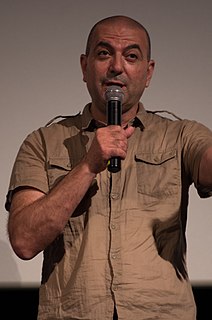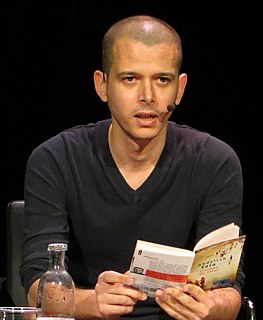A Quote by Dick Morris
'Yes' is a far more potent word than 'no' in American politics. By adopting the positions which animate the political agenda for the other side, one can disarm them and leave them sputtering with nothing to say.
Related Quotes
Politics is different than movies. Politics are controlled by leaders. Leaders of every country have different interests. And they try to explain to their people why they should take one side or the other side. But in the movie its doing the opposite. It allows you to have a Universal Experience. You don't watch it as politics but as a movie. You don't have different reactions all over. It's so universal a language. It's not a political language serving a political agenda. The language of cinema is a world language. With the Hollywood movie, it brings about the same reaction wherever it goes.
My family spent many years sleeping side by side in the same room. It's important for me to not separate myself from them or to say that I've suffered more than they have because I'm gay. We all suffered from the same political rejection, and from poverty. When you're starving with eleven other people in the same room, you become connected to them forever. We were all hungry at the same time.
We are more often than not asked, for instance, to regard Israel and Palestine as in a conflict of this kind, a framing that sets each of them on equal footing, and implicitly analogies the political situation to a fist fight, a soccer match, or a domestic quarrel. So if, then, the only two intelligible political positions are "pro-Palestinian" or "pro-Israeli," the presumption is that one's position is determined by a sentiment that wants one side to win over the other.
Are not the thoughts of the dying often turned towards the practical, painful, obscure, visceral aspect, towards the "seamy side" of death which is, as it happens, the side that death actually presents to them and forces them to feel, and which far more closely resembles a crushing burden, a difficulty in breathing, a destroying thirst, than the abstract idea to which we are accustomed to give the name of Death?
I write some art criticism, and one thing that's clear to me is that politics is fashionable in the American art world in a way it maybe isn't in American fiction. Your work of art becomes fashionable the moment it has some kind of political commentary. I think this has its dangers - the equation between fashion, politics, and art is problematic for obvious reasons. Nonetheless, the notion of politics as being de rigueur in the world of fiction is almost unthinkable. In fiction in America at the moment, the escape into whimsy is far more prevalent than the political.
Very few men can speak of Nature, for instance, with any truth. They overstep her modesty, somehow or other, and confer no favor.They do not speak a good word for her. Most cry better than they speak, and you can get more nature out of them by pinching than by addressing them. The surliness with which the woodchopper speaks of his woods, handling them as indifferently as his axe, is better than the mealy-mouthed enthusiasm of the lover of nature. Better that the primrose by the river's brim be a yellow primrose, and nothing more, than that it be something less.
Something seems wrong to most people engaged in struggle when they see more people hurt on their own side than on the other side. They are used to reading this as an indication of defeat, and a complete mental readjustment is required of them. Within the new terms of struggle, victory has nothing to do with their being able to give more punishment than they take (quite the reverse); victory has nothing to do with their being able to punish the other at all; it has to do simply with being able, finally, to make the other move... Vengeance is not the point; change is.
Elites are inevitable in politics. That is how politics is going to work. The question is, are your elites responsible, public-spirited? Do they think about the interests of others, not just themselves? And the story of Western politics since the beginning of the century is that as elites become more separated, more selfish, as they leave behind their populations and don't think about them, they become discredited. And the people look for alternatives. But the alternative is worse. Those rules of the game protect us all. And they are more precious than almost any political outcome.
People talking about politics usually start from the ass end backwards in that they think you have a political agenda, and then you make your work fit that cookie cutter. It's the other way around. One works by simple observation, looking into things. It's usually called insight and out of that comes your view - not that you have the view first and then squash everything to make it fit. I'm not interested in cutting the feet off my characters or stretching them to make them fit my certain political view.

































